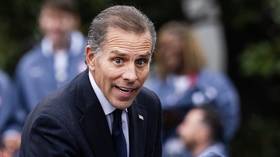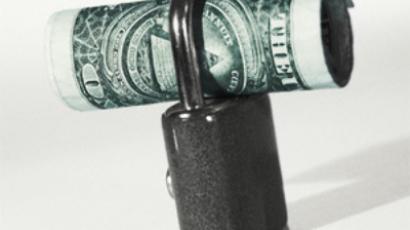Ukraine steals European gas
Ukraine has started siphoning off Russian gas bound for European customers. This follows the cutoff of gas supplies to Ukraine on January 1, after the two countries’ gas companies failed to agree on a price for 2009.
Gazprom deputy CEO Aleksandr Medvedev is in Prague to inform the EU about the on-going gas conflict with Ukraine, blaming Ukraine for the reduction in supplies.
“It's not Russia, but Ukraine which is blackmailing both Russia and Europe. It seems that Ukraine's authorities don't care about their country, but are simply playing political games. The Ukrainian President and Prime Minister are using the gas crisis for their own political aims,” said Medvedev on Saturday. “We want the EU to have full information on the issue so that it has a realistic understanding of who is to blame for the crisis.”
Gazprom's board has held an emergency meeting in Moscow where they were discussing Ukraine's siphoning of gas.
“Ukraine has cynically announced it's siphoning off gas from the export pipe. Dispatchers in the Balkans say the region is already suffering from Ukarine's actions. Gazprom believes the Balkan states need to use the Energy Charter signed by Ukraine to protect themselves. This charter says no contract disputes should affect supplies provided by a transit country,” stated Gazprom’s Deputy CEO Aleksandr Medvedev.
Earlier on Friday the company’s spokesman Sergey Kuriyanov said that Ukraine is avoiding negotiations with Gazprom. He noted that Ukraine’s Naftogaz has promised to pay $US 1.5 billion by January 11.
“But there will still be an outstanding debt of $US 614 million. Therefore, we plan to increase the transit level of gas through Belarus,” Kupriyanov said.
Ukraine, however, has denied it is siphoning off gas from transit pipes.
Also, according to Russia’s Deputy Foreign Minister Aleksandr Grushko, Russia has asked the EU parliament to hold a special meeting to discuss the issue of Russian gas transits via Ukraine.
“Gazprom representatives are ready to head to Brussels, and all European countries, to fully inform them about the dispute between Gazprom and Ukraine's Naftogaz,” he said.
Earlier Gazprom spokesman Sergey Kupriyanov said that independent auditors are being blocked from checking whether gas supplies to Europe are being hindered.
“We don't have an effective gas delivery contract with Naftogaz now. Naftogaz is currently obstructing the operators of RosUkrEnergo and is not letting them extract the gas from underground facilities which they have,” said Kupriyanov.
There is still no contract signed between the two countries and debts must be paid in full before another can be signed. The Russian energy company has also calculated over $US 600 million in penalties Ukraine owes.
Gazprom’s overall supply reduction amounted to 90 million cubic metres a day, which is roughly Ukraine’s consumption.
Prices don’t meet
Both Ukrainian President Viktor Yushchenko and Prime Minister Yulia Timoshenko have appealed to Russia not to cut gas supplies to the country and to continue talks. They've also named the price their country is prepared to pay for the gas: $US 201 per 1,000 cubic metres.
Gazprom, though, wanted a higher price – $US 250 per 1,000 cubic metres – which is almost half the market price. Ukraine turned down this offer. A statement by Gazprom followed that it would now sell gas to Ukraine at the market price of $US 418.
“Ukraine didn't accept the preferable gas price we offered – which was $US 250 per 1,000 cubic metres,” said Gazprom CEO Aleksey Miller. “So starting from January 2009, Gazprom will deliver gas to Ukraine at a market European price.”
As Europe depends on Russia for about a quarter of its gas supplies, and the fact that 80% of their supplies pass through Ukrainian pipelines, it is watching the ongoing conflict closely.
After Russia had announced a new gas price for Ukraine, Viktor Yushchenko said it would be “logical” that transit costs should go up too. The Ukrainian leader said that talks with Russia are to be resumed shortly with the final agreement to be reached by the time of the Orthodox Christmas, January 7.
A Ukrainian delegation has set off on a tour of Europe, which aims at informing the European Union about the gas situation and to provide guarantees that the gas will be transported across Ukraine as normal. Also, Ukraine's president Yushchenko has sent letters to the leaders of eight countries and to the European Commission to explain his reasons of the gas dispute.
Earlier Ukraine had threatened to confiscate Russian gas passing through the country, refusing to guarantee supplies to Europe as Russia promises to stop gas supplies to Ukraine due to debts. Gazprom called Ukraine’s reaction ‘blackmail’.
No choice
As Gazprom has vowed to maintain supplies to Europe in full, its gas will be entering Ukraine for the foreseeable future, at least until the Nord or South Stream is opened.
One major pipeline – bringing gas to Ukraine – passes through the town of Kursk, while a larger one – taking gas to Europe – operates in Voronezh (see picture).
Meanwhile, German gas company E.ON Ruhrgas has taken precautions in case supplies of Russian gas are hampered. Its press secretary Helmut Roloff said that the company has agreed on additional gas supplies from Norway in case of emergency. Nevertheless, on Friday, they received all the gas they had ordered.













